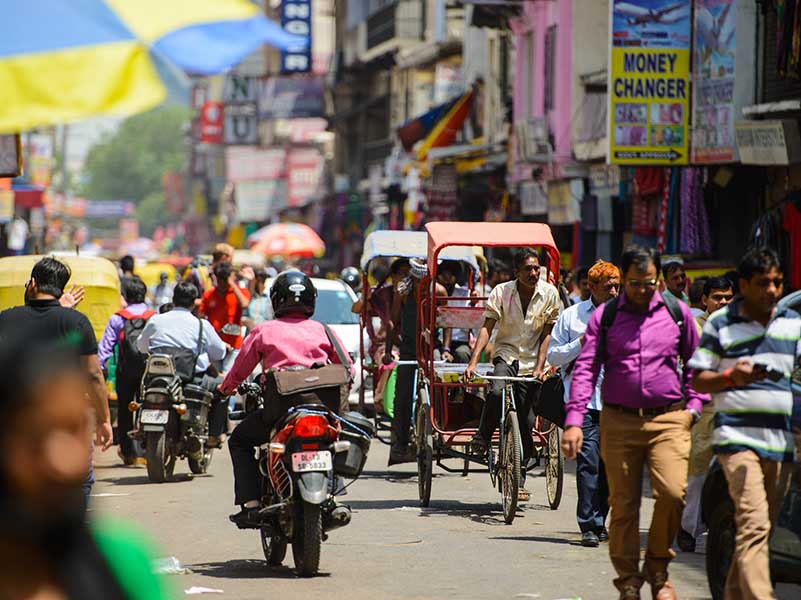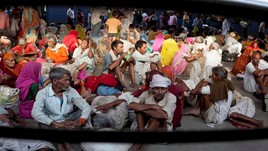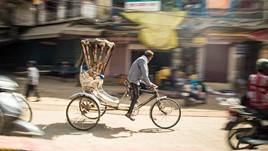
By Isabelle Anne Abraham
Travel Writer26 Nov 2019 - 5 Minute Read
He was late, but the bells were not: they shrilled incessantly through the dawn, like they did every day. As I shifted from one foot to the other, impatience growing with every second, I realized that I took his presence for granted.
I had begun a new life in India – a lonely, exhausting, and literally hungry one – leaving behind everything I knew as “home” on the other side of the world. And after several months here, the only real friend I had made was Arjun, an unassuming rickshawala who would wait outside every weekday to take me to an office.
Except this day was different. When I left my apartment that morning, he wasn’t reclined in his bicycle across the dusty street. Minutes wasted away as I idled outside the shabby building, awkwardly glancing around for the familiar face atop the familiar cycle rickshaw. When I couldn’t wait any longer without my boss calling to ask if I was going to be late again, I took off. I wasn’t owed an explanation, yet I still felt snubbed by Arjun’s absence.
As I approached the complex gate a sudden ringing made me forget my asthma, and I drew in a deep breath of the planet’s most polluted air. But I knew, before turning around, that it wasn’t who I wanted it to be. Arjun’s bell was a sweet little robin that chirped quietly for my attention. This one produced a screechy peal that pecked at my every step.
I halted as the rickety rickshaw drew up beside me and looked up into a sallow, unfamiliar face. His head beckoned head expectantly, urging me to get on. Morosely, I climbed aboard; each fare contributed significantly to Arjun’s livelihood, and this felt like a betrayal.
But that one irregularity became the new schedule.
Every day, I stalled as long as I could, hoping to see Arjun sail around the corner, gently chiming his bell in greeting. Sometimes I frowned at whichever impostor stood in his usual spot. Eventually, though, I’d always end up hitching a ride with another rickshawala.

One day, as I was disembarking, I engaged the driver in conversation to furtively find out about Arjun. He couldn’t – or wouldn’t – speak English, so I tried in appalling Hindi: “Arjun kahaan hai? Any rickshawala?”
The rickshawala looked me hard in the eyes. Pocketing my payment, he shook his head very slightly, and then rode off.
As with all the comforting things that had vanished from my life, I soon got used to it. Anything could have happened: Arjun’s rickshaw may have been confiscated by traffic police, perhaps there was a family emergency back in his home state of Bihar, or maybe … I had to consider the other possibility.
I came to accept that it wouldn’t be Arjun’s scarlet rickshaw, a dilapidated chariot, carrying me high above the daily chaos.
It wouldn’t be his staccato chuckle, bursting forth like wooden wind chimes, when I told him for the 13th time that I wasn’t enjoying my new job.
It wouldn’t be his bloodshot eyes, masked with cheerful stoicism, flickering between skittish mongrels and careless pedestrians.
It wouldn’t be his tired feet, cracked and infected by the soiled streets of New Delhi, faithfully pedaling me to work.
And it wouldn’t be his goodbye smile, burrowed under salt-and-pepper whiskers, encouraging me to face another day with impassive colleagues.
I never saw Arjun again, and the day he disappeared marked the beginning of my unraveling. Two months later I quit my job and, soon after, I quit India too – waning health and spirit in tow. It was good riddance to the roller-coaster bouts of food poisoning, the lively ailments that my body adopted, and the distant relatives who pawned me off in old family feuds.
But I didn’t get to say goodbye to the one constant in my life there: the only stability in an unpredictable city, the only comrade in a world full of hostility.
I remember how, when I first arrived in India, the jingles of the rickshaws had grated on my every nerve, and how quickly they won me over when they introduced me to Arjun.
So I have hope, perhaps naively, that the man behind the bell is still out there somewhere … alive and ringing.
This story was a winning entry in the 2019 World Nomads Travel Writing Scholarship.
Discover similar stories in
connection
Travel Writer
After a brief stint in journalism and new media, Isabelle abandoned the nine-to-five to become a freelance editor.



No Comments